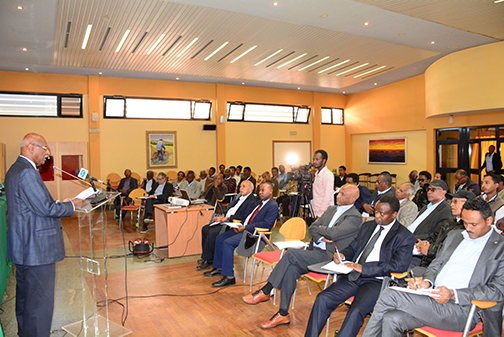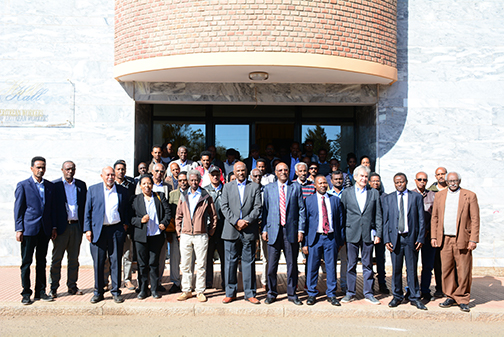Eritrea improving Codex coordination for national food standards
A consultative workshop on National Codex issues was organized on 6 December 2019 in Asmara, the capital of Eritrea. The main objectives of the workshop were to discuss national food control systems, including Codex, and to begin preparation of a project proposal for the Codex Trust Fund.
Mr Arefaine Berhe, Minister of Agriculture, who officially opened the session, told the Ministry of Information website shabait.com that food safety was central to survival and wellbeing and that regulating national food standard had become a timely issue.

Mr Arefaine Berhe, Minister of Agriculture (left)
The workshop was supported by FAO under the umbrella of the Ministry of Agriculture, where an international expert was recruited by FAO to lead the consultative process.
The representative of FAO in Eritrea, Mr Saeed Abubaker Bancie said that National Food Standard (Codex) work was an integral component of a national food control system and that food safety and quality were important aspects of food and nutrition security. Mr. Saeed also expressed FAO’s commitment to work with the Government of Eritrea to improve the Codex coordination mechanism.
Mr. Tekleab Misgina, D. G. Regulatory and Control at the Ministry of Agriculture said that National Food Standards had been established in 2004 under the auspices of the Ministry of Agriculture, and that the objective of the workshop was to further develop this initiative.

Participants in the workshop
The workshop was extremely well attended with over 50 participants taking part, including all relevant government institutions, the EU and UN resident offices in Eritrea.
Read more
WHO country profile for Eritrea
At the heart of the Codex mandate are the core values of collaboration, inclusiveness, consensus building and transparency. Governmental and non-governmental, public and private organizations alike play a vital role in ensuring Codex texts are of the highest quality and based on sound science.
Codex would have little authority in the field of international standard setting if it did not welcome and acknowledge the valuable contributions made by observers. Expert technical bodies, industry and consumer associations
contribute to the standard-setting process in a spirit of openness, collaboration and transparency.
Intergovernmental organizations (IGOs) and international non-governmental organizations (NGOs) can apply for observer status in Codex in order to attend and put forward their views at every stage of the standard-setting process.
 Current Codex Alimentarius Commission
Current Codex Alimentarius Commission
Eritrea improving Codex coordination for national food standards
A consultative workshop on National Codex issues was organized on 6 December 2019 in Asmara, the capital of Eritrea. The main objectives of the workshop were to discuss national food control systems, including Codex, and to begin preparation of a project proposal for the Codex Trust Fund.
Mr Arefaine Berhe, Minister of Agriculture, who officially opened the session, told the Ministry of Information website shabait.com that food safety was central to survival and wellbeing and that regulating national food standard had become a timely issue.

Mr Arefaine Berhe, Minister of Agriculture (left)
The workshop was supported by FAO under the umbrella of the Ministry of Agriculture, where an international expert was recruited by FAO to lead the consultative process.
The representative of FAO in Eritrea, Mr Saeed Abubaker Bancie said that National Food Standard (Codex) work was an integral component of a national food control system and that food safety and quality were important aspects of food and nutrition security. Mr. Saeed also expressed FAO’s commitment to work with the Government of Eritrea to improve the Codex coordination mechanism.
Mr. Tekleab Misgina, D. G. Regulatory and Control at the Ministry of Agriculture said that National Food Standards had been established in 2004 under the auspices of the Ministry of Agriculture, and that the objective of the workshop was to further develop this initiative.

Participants in the workshop
The workshop was extremely well attended with over 50 participants taking part, including all relevant government institutions, the EU and UN resident offices in Eritrea.
Read more
WHO country profile for Eritrea
 Codex and Observer
Codex and Observer
around the world since ancient times.
We might not always know where it comes from,
but we expect it to be available, safe and of good quality.









Leave a comment